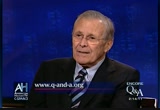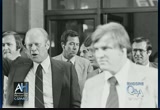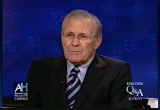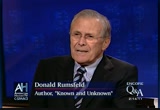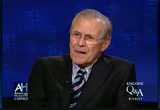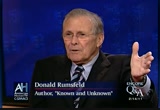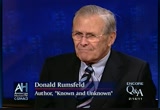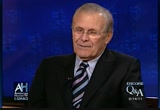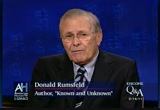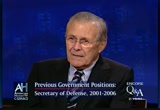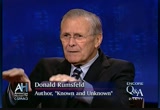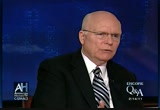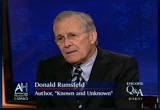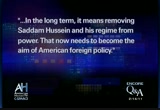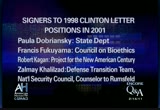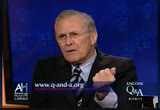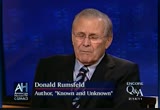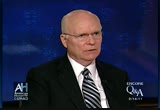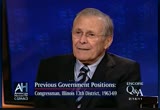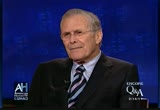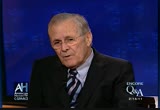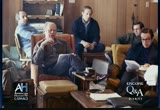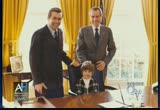tv [untitled] July 7, 2012 2:30pm-3:00pm EDT
2:30 pm
satisfied with what you've -- with what the economists and your team have put together and you're going to go back to the drawing board and by golly you're going to get this right. and he said, rummy, this is a good program and going to go ahead and do it. i told him you're going make a whale of a mistake. he went out and it was laughed at, the w.i.n. program. >> ier are this. whip inflation now. let me show you a picture of you and jerry ford, you can see it on the monitor there. he's waving and you're off to the right. what's the story there? >> that was in san francisco, and this woman, sarah jane moore, just across the street, normal street size, his car was right in front of him, and we came out together, and he had -- an elevator come down and hit
2:31 pm
his head and scarred his head. of course he was being teased by folks about bumping his head and stumbling and so forth. he's one of best athletes that ever searched in the office. i said, look, we're up in the hotel room i said when you come out, we don't want to have chefby chase have fun at your expense about the pafact you bumped your head again. come out, wave, get in the car and we'll get out to the airport. he came out and the bullet -- she shot a bullet went by his head, right by my head, the secret serviceman's head into the wall of the saint francis hotel and pushed him into the backseat of the car and the secret service guy and i were on top of him. six, eight blocks later you hear a muffle, come on, rummy, you guys get off, you're heavy. fortunate nly he wasn't hit. it was the second time that he
2:32 pm
had been -- someone tried to assassinate him in california. the other was in sacramento, in the park, as we were walking in to see governor jerry brown. >> squeaky frahm. >> yeah. >> both in prison. no, they let scaarah jane moore out. she said she was sorry she missed and wanted to create chaos, sarah jane moore. >> what does that do to you, a near-miss and to him? >> well, he -- we got him a bulletproof vest finally. and he wore it, i think, twice. but for me, what it told me was that it's practically imto be protect a person, you know, if you're a politician and you're out seeing people and doing things and around, the person who tries to do it can be killed or captured, generally. but it's just not possible to
2:33 pm
protect a person, you know, 24 hours a day against every conceivable type of attack. >> one of the things we learn in your book, connections, people you knew. i want to run another clip from that session you had which will get us to the next section i want to talk about business and government. >> as in business, i think success in government requires an orientation to the customer. the only reason for government to exist is to serve the people. it's upimportant for people in e white house to remember that. i don't know quit why it that is that fact is so easily overlooked. i suppose in business if you overlook it, you go out of business. but in government it just goes on and on and on. >> how many years in business? >> more than 20. i was chief executive of searle
2:34 pm
and chairman of gilead sciences over the years. >> how would characterize the difference between running a business, for-profit business, stock market the whole thing, and running a government agency like the department of defense? >> in business, if you do poorly, the business goes out of business. it ends. and government doesn't end. government can do quite poorly over a long, long, long period of time. and it just goes on and on and on. another thing about business is, you know, human beings, unless you're einstein or mozart and you go off and all by yourself and do something brilliant, all of the rest of us who aren't einstein or mozarts, what we do is with other people. so in business you lay out a course of action, try it, get
2:35 pm
people to help you do it, if the people do well, you reward them. if the people don't do well, you get other people to help do it. and if it does well you encourage it and keep it going. if it doesn't do well, you stop it. in government it's quite different. in government, for example, when i was running the office of economic opportunity, we would try something and before we could even get it going, the congress wanted an oversight hearing. people wanted to have an inspector general's report on it. people kept pulling it up by the roots to see how to was doing, and that's the first way to kyle something. we tried, for example, educational vouchers, we tried certain type of family assistance in welfare, performance contracting in education. but no one would let them really in -- be there long enough to see if they would work. they always wanted to examine
2:36 pm
it, debate it, discuss it, which in the case of business isn't the case at all. you can try something if it doesn't work, you stop it. if something doesn't work in government, well, my goodness, there are investigations, you made a big mistake, everything's horrible, and so the chances of doing -- having something succeed in business are vastly greater. in government, because of something done ever end, doesn't have to stop if it doesn't work well, that's not the case. >> the day we're taping this, monday, february 14th, this article in usa today, right here it says the challenge of belt tighten, pentagon has tried to for years to drop alternative engine for f-35, yet lawmakers refuse to cancel the program. you talk about the iron try ainge until your book.
2:37 pm
first what's the iron triangle? i want to ask you about things like this. >> the iron triangle, as i characterize it, is the fact that the bureaucracy in the department of defense, military and civilian, is relatively permanent. it's there. the defense contractors, that's an institution that exists in our society, as relatively perm. it's there. and the congress, the members and staffs change relatively lit until any given election psyccy and the three of them get together and develop a comfort level as to what ought to be. if somebody comes in and wants to change that namely the president of the united states gets elected and has views, take president george w. bush. he gave a speech at the sit ta d citadel, any changes that are made are tend to be made over the objection of the congress,
2:38 pm
the defense contractors, and the permanent bureaucracy. they're comfortable with the way it is. they've concluded that that's the way it ought to be. and if a president gets elected and comes in to office with different views, there tends to be natural opposition to i canceled the crusader program. i can't think of a worse name in this environment we're if than the crusader, but it was an enormous artillery piece that took two aircraft to move anywhere in the world. certainly not something that was appropriate for the 21st century and the asymmetric warfare that we're facing. and the opposition to it was just incredible. i mean, retired community in the army, the active duty community in the army, the civilian contractors, the congress. i'll give you an example. just a data point. when i was second of defense in the '70s, the defense
2:39 pm
authorization bill was 74 pages long. when i came back, in the year 2001, if i'm not mistaken the defense authorization bill was over 500 pages some what happened in the intervening period, the staffs in congress ballooned they went up by a multiple of two or three. the continuing layering of requirements from the congress generally stimulated either by the defense community or stimulated by the bureaucracy because they want to perpetuate something, ends up with rule, requirements reports, all of these things, hundreds of reports are required by the department of defense. hundreds of letter have to be answered for all kinds of detailed things. and the movement away from legislative oversight of a broad substantive nature, which would be very constructive, if hearings were held on important
2:40 pm
things, going down not to big, broad issues but down to micromanagement of the thing, the closest thing i can think of is gulliver's, remember gulliver's travels and the lilliputians would put threads over gulliver. gulliver was big and strong, and the thread, no one of the thread made a difference it wasn't a problem, or 2 or 5 or 10 or hundreds. but when you put hundreds over gulliver he couldn't get up and that's basically what's happening to the government, department of defense. >> five years running two presidents tried to relimb nate funding for backup engine on a fighter jet, a program gates called unnecessary. it goes into the details ow much money industries like general electric are giving to members of congress and the members, former omb director, rob portman written up in here about receiving $59,000 from ge over for the 2010 elections.
2:41 pm
and i guess the main point to find out from you, how can we -- with the trouble we're in economically how is this ever going to stop when the defense department who needs weapons says no and the congress says yes? >> every year there was another -- i don't know $10 billion, $12 billion that the congress added to our legislation that we didn't want. that we argued, please don't put that in there. it's for things that had nothing to do with the defense budget. now the em pli indicatiimplicat question, sure we've got serious economic problems in the country but no way to balance the budget off the defense department. >> my implication there, how do we stop this throughout government? >> exactly. it's broad, because the entitlements is where the money goes. it's the largest fraction. we're spending today a relatively small percentage of our gdp on defense compared to,
2:42 pm
for example, back in the eisenhower and kennedy era, spending i think 10%. we're now down into the 3%, 4% in that area of gdp. >> i want to put something up on the screen, because while you were offer be secretary of defense we were getting phone calls in our call-in show every day about this. you don't talk specifically about it. what i have here january 26, 1998 letter that you signed. >> '98? >> '98, when you were a civilian. >> right. >> you signed. i read it, you'll see why. this was to president clinton. and we'll show you in a minute the list of people who signed. you say here the only acceptable strategy is one that eliminates the possibility that iraq will be able to use or threaten to use weapons of mass destruction. in the near term, this means a
2:43 pm
willing tons undertake military action as diplomacy is failing, '9 8, you're not in government. it means removing saddam hussein and his regime from power. that now needs to become the aim of american foreign policy. we. >> you to or tick late this aim and implementing a strategy for removing saddam's regime from power. this will require a full complement of diplomatic and political, military efforts but we're aware of the dangers and difficulties implementing the policy we believe the dangers of failing to do so are far greater. we believe the u.s. has the authority under the existing u.n. resolutions to take the necessary steps to protect vital interests in the gulf. in any case american policy cannot continue to be crit. ed by a misguided insistence on anonymity in the u.n. security council. now if you look on the screen, you will see who signed it. and those people on the right all of those people were out of government at the time.
2:44 pm
in the administration of george bush they come in, national security council with bill crystal weekly standard, richard perle head of the defons policy bore there you are heading up the defense department. this letter, a project for a new american century, you were successful. >> it's interesting because that was 1998. and the democratic congress passed a resolution that made the policy of the united states of america regime change in iraq, and president clinton agreed with it and signed it. so there was broad agreement in both political parties. back in the '90s, there was -- here you had a country that was on state department's terrorist list, a country that had invaded kuwait. you had a country that engaged a
2:45 pm
long war with iran, a country shooting at american planes every day as the uk and u.s. aircraft patrolled the no-fly zones in the northern and southern part of iraq. and you had a country that was -- had rejected, i think eventually some 17 u.n. resolutions. so i don't think it's surprising that a number of people in both political parties held that view. >> well the by and large, these are the people that moved into the administration,ed athat view before they got into the administration. >> but broadly supported by the democrats and president clinton will i don't question that. it was interesting this was placed, this was set up by i think robert kagan and bill crystal, the office was located the weekly standard. here all of you were together then and i just wonder if you remember why you signed that letter and what the circumstances were around it because people called us all the time and said, we should have known this was coming because these guys all agreed to it beforehand.
2:46 pm
>> interesting. yeah. >> the -- whether it's a conspiracy, whether it's actually it happened. >> conspiracy? it's a matter of public record. it's people said it publicly and president clinton agreed and the democratic house and senate agreed. i mean how could anyone use the word "conspiracy"? >> well, probably hadn't heard some of the callers. the point that i want to get you to talk about is the idea that all of you knew each other then, you agreed on that point and came into government. it's no surprise that you carried that out. >> i had no intention of coming back in government, you can be sure of that. that was a big surprise for me. well, i mean, george w. bush did not sign that. >> no, he did not. dick cheney signed the original letter, the year before setting up the project for a new american century. you had richard armitage at state. you saw the list. >> yeah. well, i mean what i would say is that president bush did not sign, he is -- was the
2:47 pm
president. he is the one who made the decision. and i think that using the word "conspiracy," i think, brian, is a real unfortunate thing. >> i am not using that word. the callers used it. >> there are people who say things like that. but there is not any shred of legitimacy to the use of that word. >> all right. here is an odd and an end i want to ask you. en interview with a fellow, i book about you, and i just -- i'll run this. you tell us finally what is true and what is not true. let's run this. >> i can't be the first person to tell you that the first thing i learned in here that surprised me was that donald rumsfeld is a close friend of dan rather's and co-owns a ranch with him somewhere. where did you find that? well. >> well when i was interviewing ru rumsfeld's friends one mentioned i think he and dan rather own
2:48 pm
properties together in nm number. i said that's an interesting tidbit. dan rather is not an ally of republicans and rumsfeld is a lifelong republican. so i called rumsfeld's aide and he said to me, i think that's urban legend. i don't think that's true. two days later he comes back and says, yeah, they own a ranch together in taos, new mexico. so they met during the nixon administration, when rather covered the white house and they've just remained friends very close friends every since. >> you want facts? >> yes, sir. >> the facts are these. i didn't know dan rather. we were not close friends. our children went to school together in washington, d.c., and our wives were close friends, and dan and i became friends. i had -- i was -- it was not -- he was covering the white house. i was in government but i didn't deal with him, from a press standpoint at all. it was more of a neighborhood
2:49 pm
type thing. and at a certain point it was not taos, new mexico, it was -- i can remember the name of the town. it's over east of santa fe. and we owned a ranch there, there were five of us, i think, who owned the ranch. just different people, different relationships, and it was kind of a -- we never used it much. it was a -- an investment. and i -- i have known dan over the years. and i haven't seen him in ages. joyce, my wife joyce sees jean from time to time. >> do you still have an honorship at all? >> no, that was in the '70s and '80s. it's been, i'm going to guess, 10, 15, 20 years since we've had that ranch. it's near las vegas. new mexico. >> new mexico. >> not las vegas, nevada. >> embedding of journalists in
2:50 pm
the iraq war one point 775 journalists and photographers. whose idea was it? >> i don't know precisely. i know who i heard it first from and it was tori clark, the assistant secretary of defense for public affairs. she had for public affairs. and she had been working with her staff and various people discussing it, whether it was a good idea and whether it wasn't a good idea. at some moment it came to general myers, the chairman of the joint chiefs of staff and me, and said that she believed that this would be a good idea. that we could allow journalists to go rights into the unit that is were fighting the war in afghanistan and eventually in iraq. and let them see for themselves what the men and women in uniform were doing and how they were doing it. now, the downside to that, obviously, is if you have journalists embedded in your units, you have to protect them.
2:51 pm
you have to feed them. you have to move and transport them and move them around. and you don't want them saying things to put our troops in jeopardy by revealing what was going to be done next or that type of thing. and tori was persuasive. and eventually dick myers and i both liked the idea and we agreed. and she set about doing it and did it very, very well. and i think that an awful lot of young journalists, men and women, were willing to put themselves at risk and you have to credit them for that. they had a chance to see what, how truly magnificent the men and women are in uniform. the wonderful job they do. how well they do. how professional they are. how proud they are of what they do. and that they are good people. they are people that live next door to all of us. and so we decided that was a good idea.
2:52 pm
we did it. and for some long period it worked rather well. >> you remember probably how the media covered vietnam. >> yes. >> and now you have been through this. if a secretary of defense comes to you in the future and says, what should i do? we are faced with this again, would you recommend embedding to them? >> i would. i think that -- an awful lot of the journalists have never served in the military. and i think they probably, regardless of what they wrote or what they saw or what their editors wanted them to write, they saw how truly wonderful these young men and women are who volunteer to serve our country. and i think that's good because these people in journalism have a responsibility. they're going to be writing for the rest of their lives, probably, and if they inside know that these people are good people, that they are decent and that they're hard working and
2:53 pm
that they're brave and trying to do what's right, sure. the people in the military make mistakes, you bet. will they see thing that is are going to be not positive for the military or for the administration or for the armed forces generally? yes, they will. do they get pressure from their editors who are competing to sell newspapers or get advertising people to support their television programs? yeah they get pressure. and the old story is, if it bleeds it leads. and sometimes people get in a hurry and they want to have it fast but not right. but can you live with that? sure. i would recommend they do it. >> you mentioned tori clark. and there's one little story in here where she's mentioned, and it's -- it's -- two reasons i want to bring it up. one, you're the secretary of defense, and you have a relationship with everybody else in the defense department on a level of you're the mr.
2:54 pm
secretary, i assume. did anybody call you don? >> well, some friends do. >> in the pentagon? >> oh, sure. >> they call you all that. the story of 9/11, you had been rescuing people and had been at the pentagon until 11:00 at night. and she asked you if you called your wife. do you remember this? >> i do. first, when you say i had been rescuing people, i was out there for a short period of time. i went out there and helped out briefly and went right back to my office. i do, i don't know what time it was, 10:30 or so at night. >> 11:00 at night. >> 11:00, at night. >> yeah. >> the country had a tough day and hundreds and hundreds of thousands of people had been killed. our building was smoking and burning and they were still pulling people out of the charred remains of that area
2:55 pm
where the american plane hit our building. and i had gone back to the office and were trying to sort through. i wanted to keep the building open. i didn't want the terrorists to shut us down. and we were trying to see if that would be possible and that type of thing. at some moment she looked at me and said, have you called mrs. r.? i just said, no. she blurted out, not mr. secretary, not sir, she just blurted out, you son of a bitch. and it was a stunner. and i don't know what i said, but i probably said, you've got a point. but i talked to joyce about that since, my wife, and she said, it never crossed her mind. we has been married, what, 56 years now, 46 years or something. she said she knew where i was. she was hearing reports. i knew where she was. she had been at the defense
2:56 pm
intelligence agency with a bunch of defense members getting a briefing. she didn't have any doubt in her mind but that i had things i had to do. and so it was not a problem. tori was looking at it, tori clark was looking at it as a wife and a spouse. and it was a perfectly understandable reaction, i suppose. and yontd know what i said, but i probably said, tori, i think you got a point. >> that's what you said in the book. >> is that right? >> yeah. the presence you worked around in and observed ore the years, this is not about politics, but which president in your experience was the best suited to run the country? not from a public relations standpoint from -- because you talk a lot in this book about systems, white house systems and
2:57 pm
the dimpbtd meanings. which one did you think was best equipped to run the count in this? >> you have to appreciate they were all very different. we have to remind ourselves that the times they served were notably different. so the skillsets or the backgrounds that might be most beneficial in one period may not be quite as beneficial in another. and they also were different at different stages of their presidency. if they served over time, they might have come in with some strengths and weaknesses. and as it evolved, those weaknesses might have very well disappeared and their strengths became greater. so it's a hard question to answer. i think that from the time he was there, the fact that gerald r. ford had such basic human decency, and was so naturally a
2:58 pm
human being that people could appreciate, i think that coming in as he did when the reservoir of trust had been drained in our country following the only president in our history to resign, was a terribly difficult thing. and i think he helped heal the country. and that was important. i -- i mean, ronald reagan, beyond question had a strategic sense that was directionally correct by my standard. and enormously helpful to our country in terms of ending the cold war. he did an awful lot that was rig right. i mean, dwight eisenhower had a largely successful presidency. richard nixon, my goodness, an enormously talented man with a wonderful mind and a seriousness of purpose and brought an
2:59 pm
honestlial ended team of people into government who effected the course of government for decades after, like henry kissing jer, bill steinman, alan greenspan and so many others. >> we are out of time, but why did you not take the job to reelect the committee under richard nixon back in 1972? >> i was interested in the substantive side of the government as opposed to the political side and didn't have any interest in doing it. >> we are out of time. the book is called "known and unknown." a memoir, donald rumsfeld, thank you very much. >> thank you. >> for a dvd copy of that program, call 1-877-662-7726. for free transcripts or to give us your comments about this
170 Views
IN COLLECTIONS
CSPAN3 Television Archive
Television Archive  Television Archive News Search Service
Television Archive News Search Service 
Uploaded by TV Archive on

 Live Music Archive
Live Music Archive Librivox Free Audio
Librivox Free Audio Metropolitan Museum
Metropolitan Museum Cleveland Museum of Art
Cleveland Museum of Art Internet Arcade
Internet Arcade Console Living Room
Console Living Room Books to Borrow
Books to Borrow Open Library
Open Library TV News
TV News Understanding 9/11
Understanding 9/11